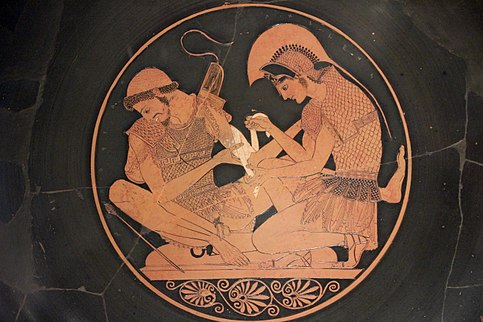Myrmidons
The myrmidons (in Greek μυρμιδόνες, “ants”) were an ancient people from Greek mythology who inhabited Phthia or Hellas, in southern Thessaly.
According to the tradition and legends of Ancient Greece, they were a brave people with very capable warriors, well known in their times. Their legacy was immortalized thanks to the reputation they gained in battles for Greece and the actions they carried out in the legendary Trojan War, where, as described by Homer in the epic poem the Iliad, they fought under the direct orders of the hero Achilles.
Traditional etymology
According to the historical work of Strabo, the Myrmidons gave themselves that name, “ants”, due to purely geographical and physical reasons that shaped the character of their land of origin:
Firstly, because the area of southern Thessaly was arid and stony, adapting to it like mere ''ants''. And secondly, to be able to till the fields, they had traditionally had to remove the hardest sediments and rocks from the lands where they lived, thus forming very long human chains for those complex labors as ''ants';', and thus accessing the wealth of the harsh area from which they came.
Ascribed mythical origins
According to the traditions of ancient Greek mythology and historiography, the Myrmidons were direct descendants of King Myrmidon, ruler of the Phthiotide region. Said monarch in turn was said to have descended from Zeus and a princess named Eurymedusa, thus attributing himself to a deified legacy. As the legends say, to achieve the conquest of the beautiful princess, the god transformed into an ant.
Another mythical version is the one told by the Roman poet Ovid in his poem The Metamorphoses: The work states that when the city of Aegina was left almost depopulated after a plague sent by the goddess Hera, King Aeacus (regent of the city and father of Peleus) begged Zeus to repopulate the city. Responding to the monarch's pleas, Zeus is said to have then turned the ants inside an oak tree into humans in order to repopulate the desolate city of Aegina.
Known Commanders
- Éaco; the grandfather of Achilles, married to Eneide, was a king of mirmidons known for his divine interrelationship and his sense of justice during his exercise of government.
- Peleo; father of Achilles, married to Tetis, was a king of mirmidons known for his epic actions (as in Yolco, or his legendary journey with the Argonauts).
- Achilles; epic hero who was immortalized during the Trojan Wars, especially thanks to the work of Homer. It was during this epic struggle when Achilles' leadership over the mirmidons gave them greater fame, becoming a people in force in the legends of the Old World.
Contenido relacionado
Antigonus I Monophthalmos
Alfonso II of Aragon
Naval modeling

